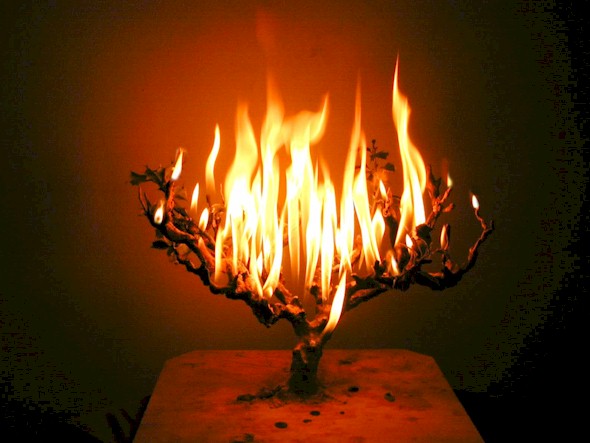 12:46 pm
12:46 pm
[Scene: Atop Mount Pisgah in Madaba, Jordan, two men gaze to the west and the southwest and reminisce.]
Manetho: This view transfigures the soul. Do you have a light?
Moses: Use the bush. Yes, soultransfiguring. I never lived there you know. I came this close.
Manetho: Frustrating.
Moses: Yup.
Manetho: [bends over the flames, his unglazed linen collar appears behind his bent head soiled by his withering hair. He rises and the men smoke together, their smokes ascending in frail stalks that flower with their speech] Handy, that. Yes, so close. And for what dear Moses? Why did you Jews not accept our culture, our religion, our language. We were the greatest, the biggest, the baddest of them all. What were you? Not much. No wealth, no country, no nothing. Primitives. Babies. We had ages of history, polity, priesthoods, literature. It boggles, your choice, it boggles the mind.
Moses: I died here. No I didn’t enter the land I was promised. I died instead, a sudden-at-the-moment-though-from-lingering-illness-often-previously-expectorated-demise.
Manetho: And with a great future behind you. You must feel such regret. All this way, intoxicated by an obscure idol. And just one, imagine! We had Isis! We had Ammon Ra! Not to mention Osiris, Horus, Anubis, Seth, Nut, Thoth. I could go on. As above so below. How can you Jews create a civilization with just one deity? And we had more. We were strong with armies and with ships. We had trade. You were weak, plagued with daylabourers. The world trembled at our name; they heard your name and said who?
Moses: And then what? As much as you rose you were destroyed, over and again. You rose and you decayed. We could have stayed and bowed our will and our spirit, and we could have prayed to your armies and deities. Yes we might have stayed by the fleshpots tasting the salt bread. And then? And then?
Manetho: [belches] Then assimilation into Egyptian life. You realize that even those things which are subject to decay are good. Nothing can be corrupted if it were not in some way good. And yet that which is corrupt is still good, for if a thing were deprived of all good, it would not exist at all.
Moses: Ah, curse you! That’s Saint Augustine. And he is talking about the creations of the obscure idol we chose instead of your life, your will. And that God of obscurity, that soultransfiguring God led us in a pillar of smoke, like these we create together, but singular and beautiful, swirling and undulating shapeless shapes. We followed that pillar of cloud by day and left our house of bondage. I spoke with the ineffable. Have you any idea of that? The eternal spoke to me on mountaintops. On this one, here. This very place.
Manetho: You Jews became outlaws.
Moses: We were given the law, and we shine even now with the light of inspiration. Had we stayed we would have been enslaved. You did us evil, you Egyptians, and you tortured us, saddling us with punishing work. Our God, the Pure One who dwells on high, raised up a community, a people beyond counting. And let me ask you this, Manetho, whose name is more remembered: mine, or any in your lists of kings?
Manetho: Ok. Ok. Next year in Jerusalem.
Moses: You’d better believe it.
Manetho: I do take exception to your last point. What has ever been greater than Egyptian civilization or lasted so long? And what people today are so kind, so beautiful. But Moses, remember please, all things that rise must fall and then must rise and then must fall and then rise again and fall again. The masters of the Mediterranean are fellaheen today. We all have our day.
Moses: We all have our day.